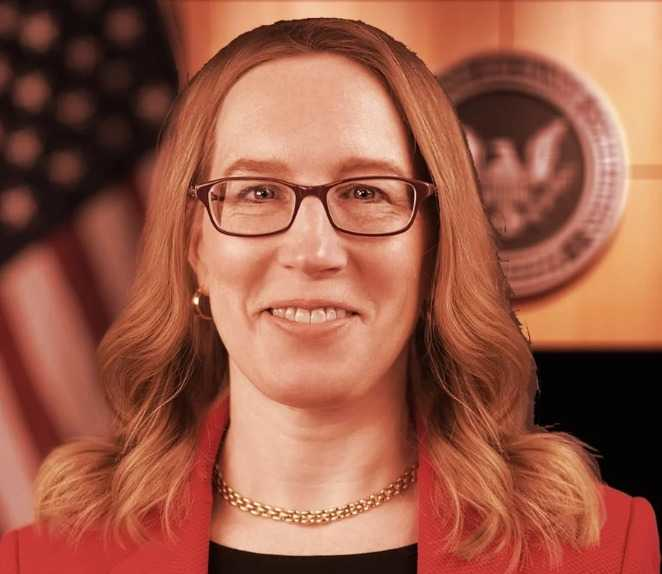There has been little love lost between the Securities and Exchange Commission and the crypto industry. For years, the federal agency has taken a hard line against the novel sector, pursuing sporadic enforcement actions against individual crypto companies but offering little in terms of a coherent regulatory policy that crypto projects could look to for guidance.
Industry leaders have long accused the SEC of taking a uniquely unfair and unreasonable approach to crypto regulation; now, one of the SEC’s own is singing the same tune.
SEC Commissioner Hester Peirce believes her agency is treating crypto unlike any other sector, with an aggressive approach that deviates from how the agency typically regulates.
“Crypto is being treated differently,” Peirce told Decrypt in an interview, explaining that many regulators saw it as a fleeting dalliance and not a burgeoning revolution.
“What drove this initially was the feeling that crypto probably wouldn’t stay around,” Peirce said. “Why invest the resources in developing some kind of framework for something that's not going to stay?”
This dismissive mentality, according to Peirce, spurred an SEC approach to crypto that relied exclusively upon isolated enforcement actions. Such a strategy, however, runs counter to how the agency usually generates rules and standards.
“Typically, when we write a rule, we go out with a proposal,” said Peirce. “People are talking to the regulator, we're talking to the public. It's a very healthy conversation.”
There’s not much that’s healthy about how the SEC interacted with crypto companies thus far, according to the Commissioner: bringing them in one at a time—not to collaborate on policy, but to dictate the terms of a particular enforcement.
“Nobody else is in the room,” said Peirce. “The customers aren't in the room. The competitors aren't in the room. And the regulator has the leverage because the regulator's about to bring an enforcement action. It’s just not a good way of regulating.”
The SEC’s current chair, Gary Gensler, has repeatedly insisted that he treats crypto no differently than any other market under his purview. He’s also made a point of responding to criticism of his crypto policies by putting the onus on crypto companies, encouraging them to “come in and talk” if they are unhappy about regulations being generated.
Billionaire investor Mark Cuban recently slammed Gensler for such comments, dismissing the chair’s invitations as empty and cynical.
“Come in and talk to who? Set up an appointment how?” Cuban tweeted at Gensler in late August. “You using Calendly these days?”
Peirce has similarly found such invitations to be effectively meaningless, and she said the SEC’s past meetings with crypto companies to have led nowhere by design.
“If you're going to tell people to come in, people need to see people walking in the front door and coming out again, holding an exemptive order or something that allows them to move forward with their business and allows us to achieve our regulatory objectives,” said Peirce. “But if you just see people walking in and then you see them walking out either with an enforcement action, or with nothing, people aren't going to want to come in the door.”
The SEC has thus far produced not a single crypto-related exemptive order—a statement from the agency clarifying that a certain action would not be considered a securities violation or pursued by the SEC as such.
The SEC generates exemptive orders to help educate companies on how to properly and legally navigate existing regulations. If history is any indicator, an exemptive order on crypto isn’t likely to appear any time soon.
Peirce views the SEC’s lack of willingness to dialogue with the crypto industry, more than anything else, as a missed opportunity: one that could result in the federal agency being boxed out of having a leading role in shaping a critical industry.
“Ultimately, you're going to see aspects of this thing called crypto permeating all aspects of our lives,” said Peirce. “And crypto once looked to the SEC, and it said, ‘well, we think we can work with the SEC to build something that makes sense.’
“Now more and more, I'm hearing people say, ‘Well, I'm just going to go to the CFTC [Commodities Futures Trading Commission] and hope that they come up with a regulatory regime we like,’” she added.
“That is too bad, that people have given up on us,” said Peirce. “Because we haven't taken those steps to work in good faith.”











 All while Pfizer—a company with a $2.3 billion criminal fine for fraudulent marketing, bribery, and kickbacks—was given blanket immunity from liability and billions in taxpayer dollars to produce a vaccine in record time with no long-term safety data.
All while Pfizer—a company with a $2.3 billion criminal fine for fraudulent marketing, bribery, and kickbacks—was given blanket immunity from liability and billions in taxpayer dollars to produce a vaccine in record time with no long-term safety data.
























